US Applauds UN Efforts To Draw Attention To Iran’s Rights Violations
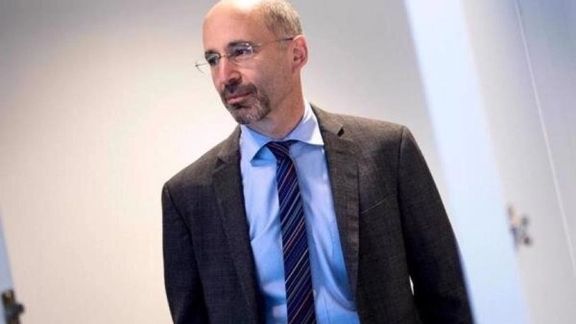
The US special envoy for Iran. Rob Malley, praised the efforts of UN experts to draw attention to the continuing crackdown on civil society and popular protests in Iran.

The US special envoy for Iran. Rob Malley, praised the efforts of UN experts to draw attention to the continuing crackdown on civil society and popular protests in Iran.
In a tweet on Friday, Malley applauded “the work of UN experts, including the Special Rapporteur for Human Rights in Iran, in calling attention to the continued crackdown against civil society in Iran.”
During the past few days, the United Nations Secretary General António Guterres as well as a group of UN human rights experts have expressed serious concerns about the violent clampdown by the Islamic Republic.
Guterres submitted an interim report to the Human Rights Council depicting the grim human rights situation in Iran on Thursday, a day after rights experts issued a statement urging those responsible for using excessive force to be held to account through comprehensive and independent investigations.
The UN chief urged the Iranian government to abolish the death penalty, release all persons detained arbitrarily immediately, and set up investigations into the use of excessive and lethal force during protests.
The UN human rights experts said, “We are alarmed at the recent escalation of allegedly arbitrary arrests of teachers, labor rights defenders and union leaders, lawyers, human rights defenders and other civil society actors.”
On Thursday, the US State Department also hailed the UN experts, and said their concerns are "certainly the concern of ours,” adding, “This is why we condemned the use of violence against these peaceful protesters. We made the point that we support the right of these protesters to peacefully exercise their fundamental freedoms."
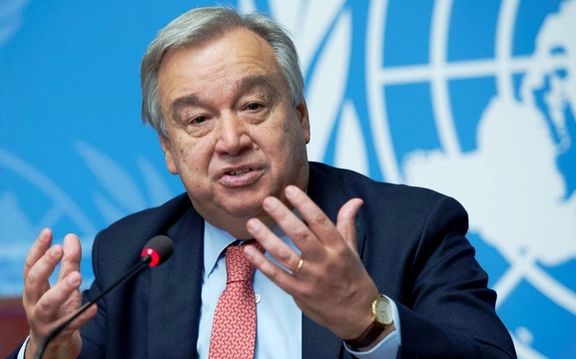
In its latest report on the situation of human rights in Iran, the United Nations has expressed concern over excessive force against dissidents and protests.
UN Secretary General António Guterres submitted an interim report on Iran’s rights situation on June 16 -- covering the period from June 11, 2021 to March 20 2022 -- to be presented to the Human Rights Council at its 50th regular session (13 June – 8 July 2022).
The report received testimonies and reports by non-governmental organizations, individuals, victims and their families “concerning potential violations of the right to life allegedly by the State, including arbitrary executions, use of deadly force by security forces against peaceful protesters and border couriers, as well as arbitrary deprivation of life in detention as a result of torture or denial of timely access to medical care.”
The Office of the United Nations High Commissioner for Human Rights continued to receive reports of torture and ill-treatment in places of detention, resulting in death, the UN chief said, mentioning the names of numerous people who died in custody such as Shahin Naseri, Amirhossein Hatami, Adel Kianpour and Baktash Abtin.
Decrying “the high number of death penalty sentences and executions” and “reports of death in prison due to denial of adequate and timely medical care,” the UN chief said that the number of executions in the Iran increased from at least 260 cases in 2020 to 310 individuals in 2021, and the number of continued to rise into 2022.
According to the report, between 1 January 2022 and 20 March 2022, at least 105 people were executed, and in March 2022, 52 prisoners convicted and sentenced to death on drug-related charges were transferred for execution to Shiraz Central Prison. By mid-March, at least 16 of them had been executed.
It also condemned Iran’s “execution of child offenders,” saying, “Under international human rights instruments, to which the Islamic Republic of Iran is a party, capital punishment shall not be imposed for offenses committed by persons below 18 years of age.”
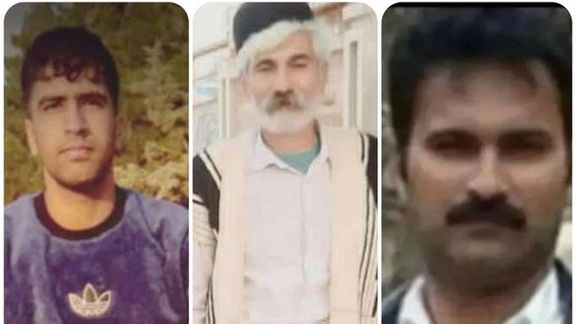
Referring to protests that broke out in over 26 cities in Khuzestan Province over water shortages in July 2021, the UN chief also criticized “enforced disappearances of protesters” and said that “on some occasions, the authorities reportedly used plainclothes agents to pose as armed or violent protesters, and subsequently blamed the deaths of protesters on them”
Guterres also expressed concern about the potential impacts of Iran’s policies aimed at increasing population growth, such as the Youthful Population and Protection of the Family law, which restricts sale of contraceptives, bans sterilization and restricts abortion, "on men, women and girls’ rights to sexual and reproductive health.”
The UN also voiced concern at “further legislative measures aimed at restricting the digital space,” including the User Protection Bill which “would grant the government and army extensive control over infrastructure that connects Iran to the global internet.”
The report also denounced the manner in which the Islamic Republic is using Article 49 of the Constitution to “confiscate wealth and property of minorities, particularly the Baha’i religious minority, as well as of political dissidents and their families.”
Guterres also noted that “journalists, including journalists abroad working for foreign media outlets, continued to be intimidated. Such acts included coercion by proxy through threats against family members inside the country, economic pressure, travel bans and interrogations.”
He also slammed the intensifying summoning, arrest and detention of labor rights defenders amidst growing protests by teachers, retirees and other groups demanding labor and social security rights.
Low growth, high inflation and widespread unemployment have caused widening economic disparities, the report added.
Guterres concluded his report with a list of recommendations to improve the human rights situation in the country, including abolishing the death penalty, reforms to strengthen the right to fair trial in line with international standards, releasing all persons detained arbitrarily immediately, investigations into the use of excessive and lethal force during protests and steps to eliminate all forms of discrimination against women and girls.
In March, Iran's foreign ministry accused the UN Human Rights rapporteur of 'politicizing' the situation of human rights in Iran and issuing biased reports, in reference to the report by UN special rapporteur Javaid Rehman.
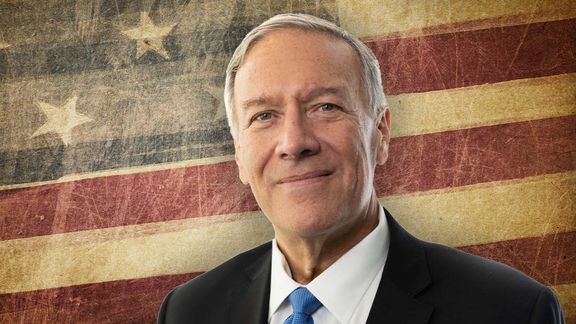
“Banquet of Murderers” read the headline on Iran’s Fars news affiliated with the IRGC, reporting on an Al Arabiya interview with former US Secretary of State Mike Pompeo.
Although the report on Fridaywas not distorted and summarized Pompeo’s remarks in Persian, but the headline referred to his role in the targeted killing of Iranian military and intelligence strongman, Qasem Soleimani by the United States in 2020.
The headline was also a broadside at Saudi Arabia and its media, Al Arabiya, for the killing of Jamal Khashoggi in 2018 in Turkey. “Banquet of Murderers: Soleimani’s Killer Is Guest of Khashoggi’s Murderers,” said the full headline.
In the interview, Pompeo called the Iranian regime “evil theocrats” who aim to destroy the US and Israel. He also sharply criticized President Joe Biden’s policy toward the Islamic Republic.
“We know who the Iranian regime is. These are evil theocrats intent on the destruction of the nation of Israel and the United States of America. We ought not to be negotiating to figure out how much money to give them in exchange for an ephemeral promise for just a moment to slow down their enrichment and weapons program,” Pompeo told Al Arabiya.
The Trump administration withdrew from the Obama-era nuclear agreement with Iran, supported by Israel and Saudi Arabia, two countries along with the United Arab Emirates who have been concerned about Tehran’s nuclear and missile programs.
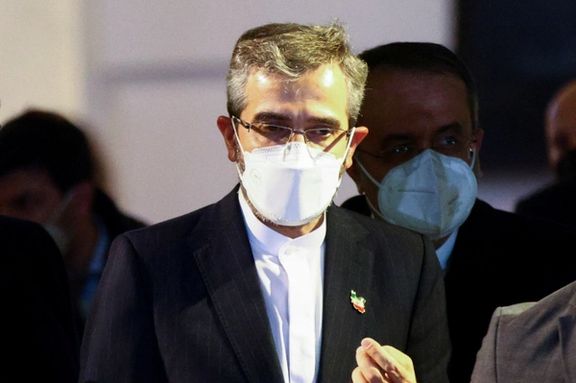
A series of strange tweets Thursday by Iran’s chief nuclear negotiator, Ali Bagheri-Kani, created confusion in Iran, with readers not knowing how to interpret them.
“We shan’t spend foreign policy treasures for the success of diplomacy; instead, we will sacrifice ourselves to achieve foreign policy objectives,” Bagheri-Kani tweeted in English, which was the translation of a Persian tweet same day.
This was the most confusing post, which led hundreds of Iranians to joke in reply. Some said about the original Persian text that they could not understand what the diplomat meant, and maybe it was “bad Google translation from Russian.”
One user went as far as to say that “surely Putin send you the text in Russian and the translation came out bad.”
Some thought Bagheri-Kani was sending cryptic messages about the stalled nuclear talks with the United States, not knowing to take them as a positive or negative sign.
Etemad Online website on Friday clarified that Bagheri-Kani apparently delivered a speech on Thursday and the tweets were quotes from his remarks, taken out of context and sounding vague and even poetic.
“The same Iran which managed to defeat the U.S. 'maximum pressure campaign', will not allow the Zionists to legitimize Iranophobia and anti-Iran campaign by spearheading the “maximum blackmail game,” was another tweet.
The main factor that surprized the public was Bagheri-Kani’s habit of not tweeting very often and then sending several messages in quick succession.
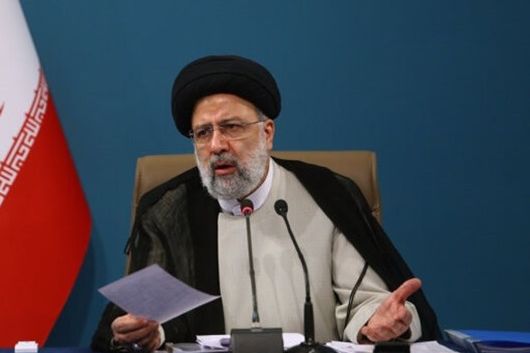
Iranian President Ebrahim Raisi says the United States sends mixed signals by asking Iran for talks and imposing new sanctions at the same time.
Raisi said on Friday that he is “surprised by the Americans who send messages for negotiation and agreement and add to their list of sanctions,” noting that “The world should give us the right not to trust the United States because it breaks its pacts”
He responded to Washington’s move on Thursday to sanction firms and individuals for violating US sanctions by exporting petrochemicals.
The Vienna talks aimed at reviving the 2015 nucellar deal between Tehran and world powers have stalled since March mainly because of Iran’s demand for the US to remove the Revolutionary Guard (IRGC) from its terrorism list (FTO) and the recent missile attacks have shed more doubts on whether President Joe Biden’s administration would take such a step.
In a clear move to pressure Iran on stalled nuclear negotiations, the Biden administration sanctioned Chinese, Emirati and Iranian companies engaged in illicit export of Iranian petrochemicals.
Iranian crude exports declined in May because of Russian competition, as it offers cheaper oil to China. Iran’s income from oil products and petrochemicals was $23 billion from March 2021 to March 2022 and it aimed to boost it to $27 billion.
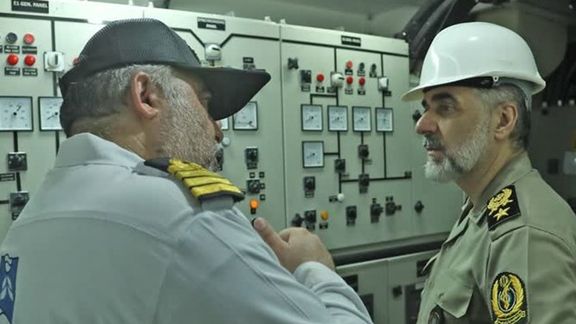
The Iranian defense minister reiterated Iran’s position Friday that the cause of insecurity in the region is the presence of extra-regional foreign forces.
Brigadier General Mohammad-Reza Gharaei Ashtiani made the remarks during his trip to the southern province of Hormozgan, where he visited the Ministry of Defense's naval projects in Bandar Abbas and other cities.
“Our message to the region and the world is a message of peace and tranquility,” he said, adding that “we believe that peace and stability in the region can be achieved with the presence and participation of all countries in the region.”
Iran often uses foreign forces in the region” to refer to the military presence of the United States in the Middle East and the Persian Gulf.
Having been briefed on the projects to build destroyers as well as surface and submarine vessels, Ashtiani said, "Increasing Iran’s military might in all aspects of defense, including land and air, and especially sea, is one of the priorities of the country's defense programs."
Highlighting that Iran's geopolitical position in the Persian Gulf is of strategic importance to the country, he said that the Defense Ministry will update and equip the Navy “in accordance with the regional threats in all its territorial waters.”
On Tuesday, the Israeli defense minister intensified pressure on Iran by calling for a military front with US leadership in the Middle East ahead of a visit to the region by President Joe Biden, saying that Israel and Arab countries that share its worries about Iran should build up their military capabilities under Washington's aegis.
Describing Iran as the most destabilizing force in the Middle East, the new CENTCOM commander in May called for coordinated efforts to confront Iran.